Skype: neodalle-travel
Tel: +86 135 7447 2266
E-mail: sales@visitaroundchina.com

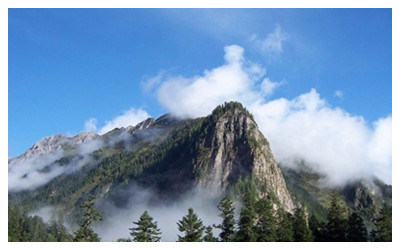 Sword Rock and Suspended Spring
Sword Rock and Suspended Spring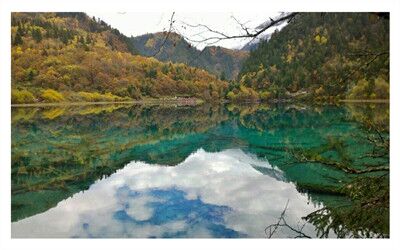 Mirror Lake, wrapped by forests, is a narrow and long lake about 1,000 meters (1,094 yards) in length. The mountain on the opposite side is like a huge stone screen. On the right is the lower reach of Mirror Lake, abutting the Nuorilang Lake Cluster and on the left is the upper reach that joins the Mirror Lake Valley. In the rosy dawns, the lake is as smooth as a mirror and blue sky, white clouds, the mountains far away and trees nearby can all be seen reflected in the lake. What is more wonderful is that you can see the conjured images that the fish are swimming in the sky and the birds are flying in the lake! Near the lake there is a tree reaching the sky, which is tightly twisted by a long vine, just like two sweet lovers. Therefore, people gave Mirror Lake another romantic name, Love Park.
Mirror Lake, wrapped by forests, is a narrow and long lake about 1,000 meters (1,094 yards) in length. The mountain on the opposite side is like a huge stone screen. On the right is the lower reach of Mirror Lake, abutting the Nuorilang Lake Cluster and on the left is the upper reach that joins the Mirror Lake Valley. In the rosy dawns, the lake is as smooth as a mirror and blue sky, white clouds, the mountains far away and trees nearby can all be seen reflected in the lake. What is more wonderful is that you can see the conjured images that the fish are swimming in the sky and the birds are flying in the lake! Near the lake there is a tree reaching the sky, which is tightly twisted by a long vine, just like two sweet lovers. Therefore, people gave Mirror Lake another romantic name, Love Park.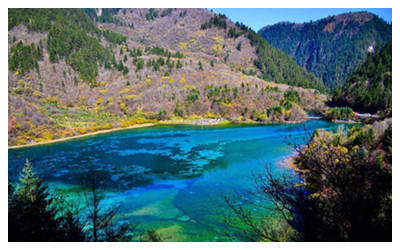 Praised as the pride of Jiuzhai Valley, Five-Flower Lake lies at the end of the upper reach of Peacock River, 2,472 meters (about 8,110 feet) above the sea level and five meters (about 16 feet) in depth. Most of the colorful leaves are gathered in the lakefront and interlaced as brocades. The water that contains calcium carbonate as well as hydrophytes with different colors presents a versicolor sight, azure blue, blackish green and light yellow, etc, so it is named Five-Flower Lake. The local people say that it is a holy lake, and where there is the water, there must be flourishing flowers and trees. When looking down from the mountain, you will find that the lake with hills on three sides is just like a huge upended cucurbit pouring colorful water to the lower place.
Praised as the pride of Jiuzhai Valley, Five-Flower Lake lies at the end of the upper reach of Peacock River, 2,472 meters (about 8,110 feet) above the sea level and five meters (about 16 feet) in depth. Most of the colorful leaves are gathered in the lakefront and interlaced as brocades. The water that contains calcium carbonate as well as hydrophytes with different colors presents a versicolor sight, azure blue, blackish green and light yellow, etc, so it is named Five-Flower Lake. The local people say that it is a holy lake, and where there is the water, there must be flourishing flowers and trees. When looking down from the mountain, you will find that the lake with hills on three sides is just like a huge upended cucurbit pouring colorful water to the lower place.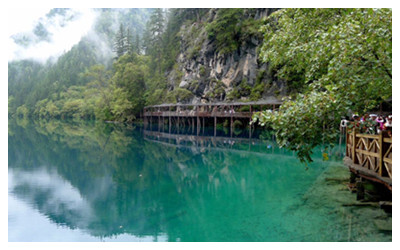 Panda Lake, Pandas are regarded as lucky and endearing animals. It is said that pandas in Jiuzhaigou like to drink water and play in this lake, so the lake is called Panda Lake. It is 2,587 meters (about 8,488 feet) above sea level and 14 meters (about 46 meters) in depth. The water is clear and transparent. Especially on fine days, the blue sky and white cloud are mirrored in the lake. There are inverted images of cliffs with strange textures in the lakesides and the white stones with black lines in the lake, all of them have made the Panda Lake an interesting and beautiful place.
Panda Lake, Pandas are regarded as lucky and endearing animals. It is said that pandas in Jiuzhaigou like to drink water and play in this lake, so the lake is called Panda Lake. It is 2,587 meters (about 8,488 feet) above sea level and 14 meters (about 46 meters) in depth. The water is clear and transparent. Especially on fine days, the blue sky and white cloud are mirrored in the lake. There are inverted images of cliffs with strange textures in the lakesides and the white stones with black lines in the lake, all of them have made the Panda Lake an interesting and beautiful place.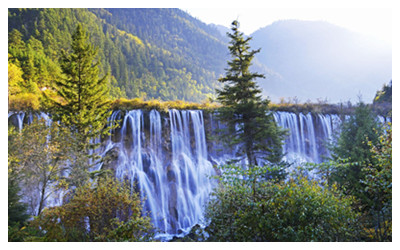 damaged in the earthquake on August 8, 2017. On the afternoon of August 10, 2017, it collapsed and the once magnificent waterfall no longer exists. The former norilang waterfall, at 2365 meters above sea level, is located near the norilang tourist center. The waterfall is 270 meters wide and 24.5 meters high. It is one of the largest calcified waterfalls in China and also the widest waterfall in China. Many films and TV plays have been shot here, including the end of the 1986 CCTV TV series journey to the west. Nuorilang waterfall means magnificent waterfall in Tibetan. It was a multi-level drop, 140 meters wide curtain of water from the two mountains fly out, straight bai chi cliff, forming a rare forest waterfall. There is a viewing platform across the waterfall, standing on the platform, the panoramic view of the waterfall, autumn, three hundred meters of the waterfall in the autumn, clouds and fog background, into a magnificent scene.
damaged in the earthquake on August 8, 2017. On the afternoon of August 10, 2017, it collapsed and the once magnificent waterfall no longer exists. The former norilang waterfall, at 2365 meters above sea level, is located near the norilang tourist center. The waterfall is 270 meters wide and 24.5 meters high. It is one of the largest calcified waterfalls in China and also the widest waterfall in China. Many films and TV plays have been shot here, including the end of the 1986 CCTV TV series journey to the west. Nuorilang waterfall means magnificent waterfall in Tibetan. It was a multi-level drop, 140 meters wide curtain of water from the two mountains fly out, straight bai chi cliff, forming a rare forest waterfall. There is a viewing platform across the waterfall, standing on the platform, the panoramic view of the waterfall, autumn, three hundred meters of the waterfall in the autumn, clouds and fog background, into a magnificent scene.Travel Tips
Add: Inside Jiuzhaigou National Park, Sichuan Province.
Entrance Fee: CNY 280 ( within Jiuzhaigou Valley)
Opening Hours:07:00-18:00
 Ask Questions ?
Ask Questions ?